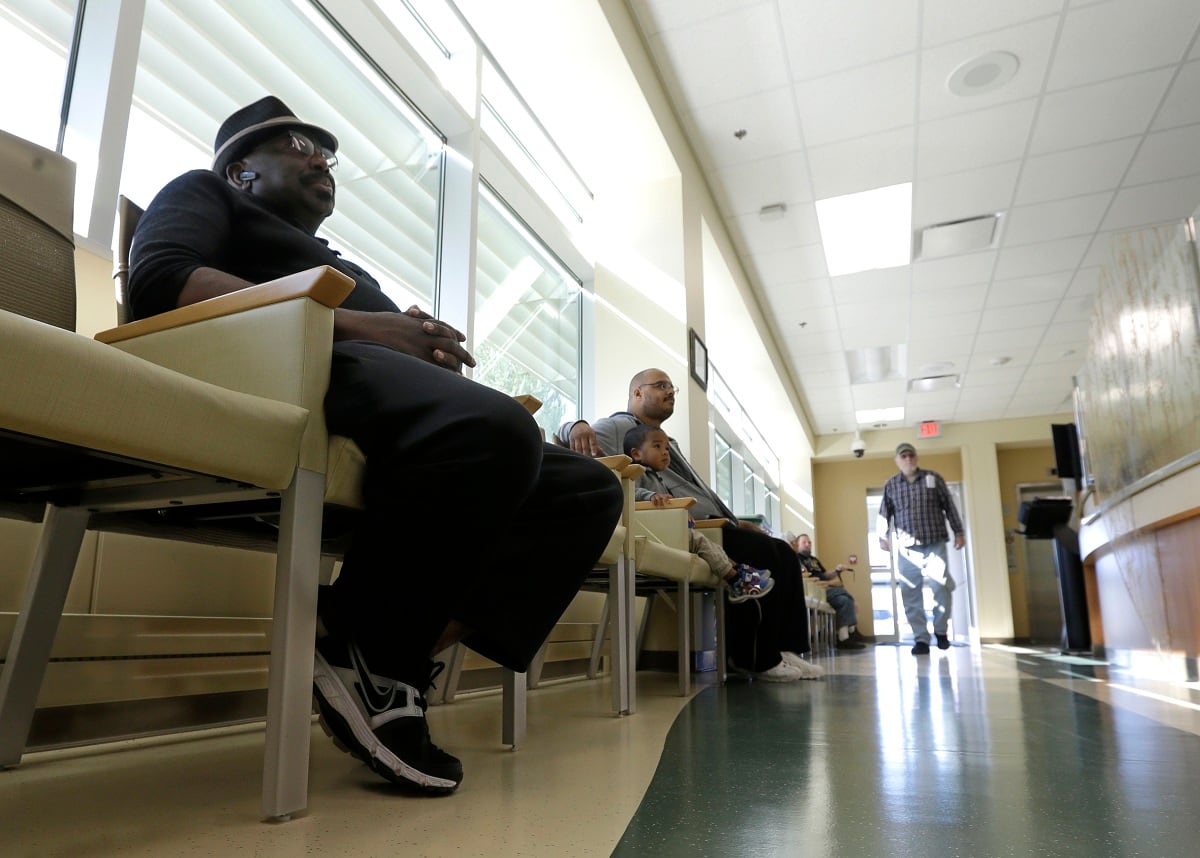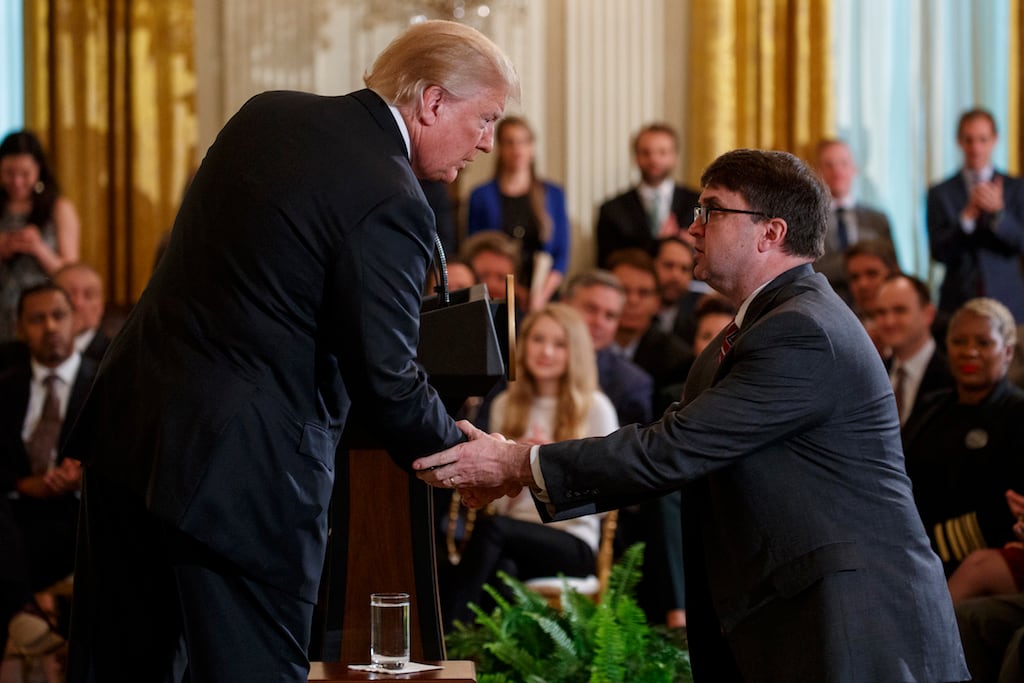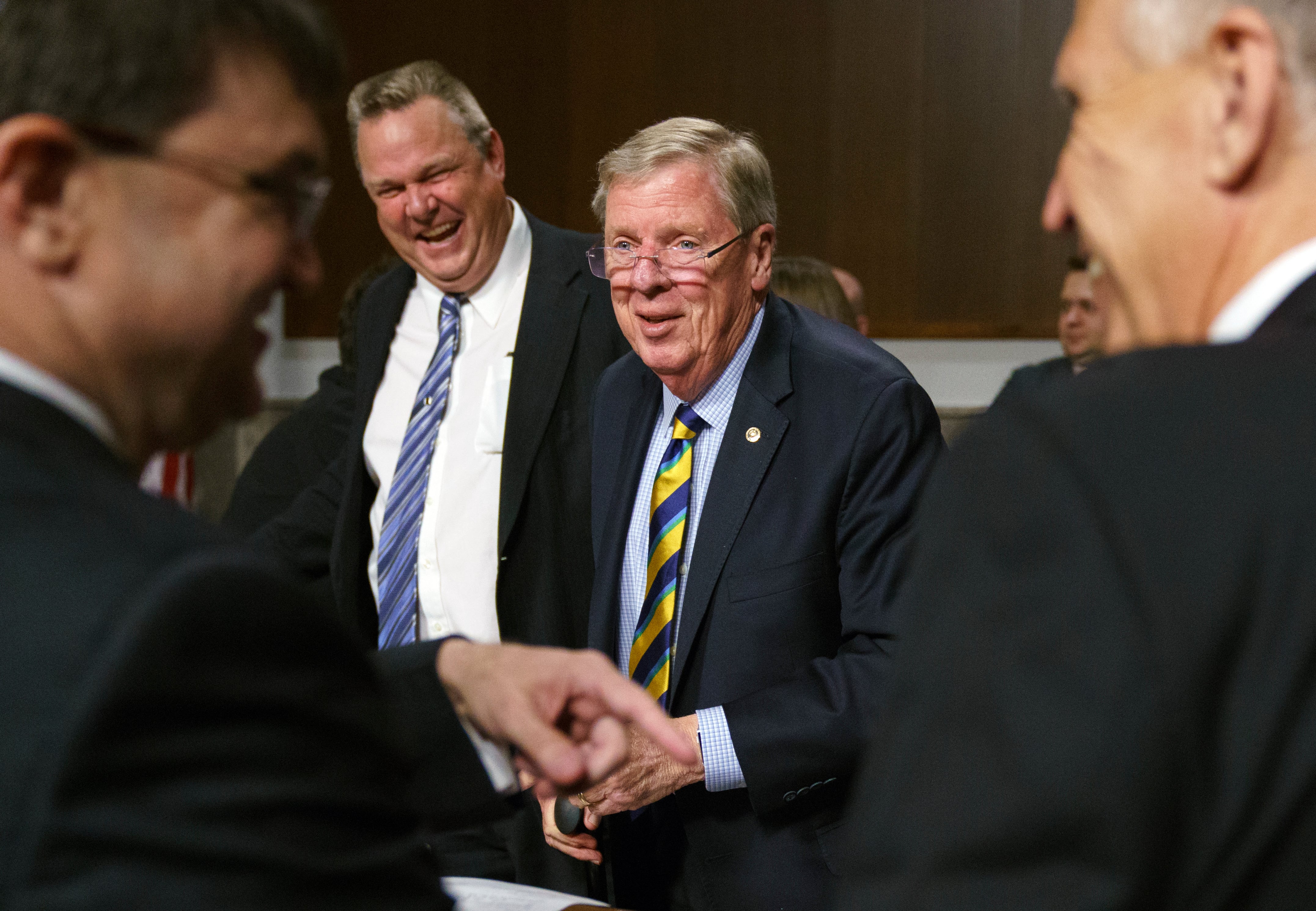Veterans Affairs Secretary Robert Wilkie frequently reminds people that he has only been on the job for eight months. He also knows the decisions he is making now could affect the department for decades to come.
“For the first time since the fall of Saigon, more than half of our veterans are under the age of 65,” Wilkie told Military Times in an exclusive interview last week. “They have very different attitudes when it comes to care. They want care that’s close to home. They want care that is quick. They’re not from a world where they are comfortable sitting and waiting.”
Starting June 6, Wilkie insists, those veterans won’t have to wait any longer.
Under the VA Mission Act, passed by Congress last summer, the department is set for a sweeping expansion of its community care program, the rules governing when veterans can see a private health care provider at taxpayer expense.
RELATED

“(Now) the veteran is at the center of his health care, not the institution,” he said, repeating a line he has delivered to Congress multiple times in recent months. “And if there is something we cannot provide, he has the option of going to [the] private sector or waiting for us to provide it. That is a sea change in terms of the way we operate.”
Those congressional appearances are part of a larger offensive by department officials against persistent charges that the upcoming changes will outsource too much of the department’s responsibilities and resources — “privatization of VA,” according to critics.
A coalition of congressional Democrats and veterans advocates are rallying against the looming changes, saying that pushing too many veterans into the private sector will hollow out the federal health care system.
On the other hand, President Donald Trump has made “veterans’ choice” a key talking point of his stump speeches since last summer, praising his administration’s success at bringing better and more convenient care to veterans even before the new rules are in place.
The 56-year-old Wilkie — a longtime conservative operative who has held key leadership posts under presidents and members of Congress for three decades — is left in the middle, working to calm critics and turn the commander-in-chief’s boasts into reality.
Already well-known and controversial in the veterans community, Wilkie is poised to see his public profile grow even larger — whether he wants it or not — as that June 6 deadline approaches.
For his part, the secretary calls this “the greatest transformative period in the history of our VA” and says that the changes will dramatically improve operations and public perception of the sprawling veterans bureaucracy, which employs more than 400,000 people and could see its budget swell to nearly $220 billion next year.
And, he says, the department is ready for it.
RELATED

A family tradition
Wilkie served in both the Air Force Reserve and Navy Reserve, but he rarely goes into any detail about his time in the military when speaking publicly on veterans issues.
He does talk extensively about his family’s military lineage. His great-grandfather served in the final Allied offensive of World War II. His father earned three Purple Hearts and five Bronze Stars during the Vietnam War and was severely injured during the invasion of Cambodia before Wilkie was a teenager.
“He had a lifetime of chronic pain,” he said. “But what made his life more difficult was that there was only one record of his medical care and that was 800 pages.”
The difficulties his family faced navigating the veterans health system inform his work today. Pictures of those family members occupy Wilkie’s sparsely decorated office in Washington, D.C., along with several other family mementos.
And, on the wall opposite his desk is the placard from his previous job as Under Secretary of Defense for Personnel and Readiness, which Wilkie himself didn’t get to see much during that Pentagon stint.
Within three months of being confirmed for the job, Trump tapped him to serve as acting VA secretary, following David Shulkin’s dismissal — a messy firing over Twitter that spurred questions about Trump’s volatility and the legality of operations at the department.
Then, two months into that assignment, Trump announced during a White House event on criminal justice reform that Wilkie would be tapped as the permanent replacement. Wilkie was visibly surprised by the announcement.
“Jim Mattis [the former defense secretary, who was Wilkie’s boss at the time] will tell you it was a surprise to him, too,” Wilkie said.
The current secretary is reluctant to speak about Shulkin’s dismissal, which came amid tensions between VA leadership and the White House over a host of policy issues. Shulkin, the first non-veteran to hold the top VA job, was also an Obama administration holdover who received lavish praise from Trump initially but was the subject of his scorn by the end.
In between, Trump nominated White House physician Rear Adm. Ronny Jackson to the post, only to see his candidacy withdrawn amid charges of workplace malfeasance. A year later, Wilkie says that his department has worked past “the turmoil” of that time.
“In the last eight months, this place has been fairly calm,” he said. “We’ve got a good leadership team in place now. Almost all of our leaders have extensive military experience. So they speak the language … The department did not have that leadership team in place in the time before I got here.”
RELATED

The privatization fight
The turmoil has been replaced with an intense focus on the Mission Act, which includes an overhaul of VA caregiver support rules, plans for a base-closing-style commission for VA facilities and the new outside care rules. The measure was signed into law by Trump just a few weeks before Wilkie was sworn in as the department’s 10th secretary.
The caregiver rules and facility review will come later this year. But revising the outside care rules has been the primary challenge facing VA leadership since Wilkie walked into VA headquarters, located less than a block away from the White House.
Currently, taxpayer-funded private-sector medical appointments are available to veterans who live 40 miles from the nearest VA facility or face a wait of up to 30 days for care. The new rules, developed by Wilkie’s team, would extend eligibility to veterans who face a 20-day wait or a 30-minute care ride to a VA facility.
“It is not what it has been purported to be, and that is what I would call ‘libertarian choice,’” he said. “You don't give a veteran a card and say, ‘thank you very much, the private sector is wide open to you.’”
“I’ve heard some people say that the changes in access standards and availability standards were arbitrary, capricious. Well, if they have that charge, they need to go to the members of Congress who wrote the Mission Act. Because the Mission Act gave me very clear instructions on how I come up with access standards.”
But critics are unhappy with more than just the rules as written. They say that Trump’s team is working to undermine VA health care as a viable enterprise, by promoting outside care as a better solution for veterans’ medical needs.
Groups such as Veterans of Foreign Wars and Disabled American Veterans has voiced concerns that the messaging of the changes emphasizes convenience of care over quality. Outside doctors, they note, don’t necessarily have experience diagnosing post-traumatic stress disorder or burn pit illnesses. They’d rather see efforts put into improving VA access options.
For Wilkie, it’s not an either-or option.
“Our spending on tele-health has gone up at an exponential rate in the last few years,” he said. “We’re on the cutting edge of using it for mental health issues. It also reaches into rural areas and, importantly, we’re allowed to [provide it across state lines], what the rest of the country can’t do.”
Asked if VA will be promoting outside care over VA care to veterans, Wilkie did not provide a direct answer.
“The Mission Act says up front that it’s the veterans’ health interest that is first and foremost. So that veteran will have a care team at VA who will speak with him and talk about the options for him.
“Nine times out of 10, he's been probably going to stay with the people that he knows and the community he knows … The pull of the culture on people to be where they share experiences with others is very different from any other segment of the country.
“And as I said even as VA has had hiccups — and we’ve overcome those hiccups — we’ve actually seen the number of veterans asking to go into the private sector drop.”
RELATED

A looming deadline
The rules changes could triple the number of veterans eligible for health care outside of the VA system, but VA has predicted that they will not see any substantial increase in usage of private care.
Congressional critics have called that laughable.
Last month, a group of 55 lawmakers — all Democrats — sent a seven-page letter to VA officials detailing concerns over how the new rules were crafted and their potential impact, calling it “the first step towards dismantling the system.”
It’s a charge that Trump has invited since before he took office, when he floated the idea of outsourcing some or all of veterans health care to private providers. It’s also an accusation Wilkie has had to combat since his first day in office.
He believes he has balanced being a cheerleader for the department with enacting the reforms mandated by Congress.
“When it comes to health care, the private sector is not always the best place,” he said. “The Journal of the American Medical Association, as you know, has said that when it comes to primary care and specialty care like cardiology, our wait times are good or better than any.
“We have same-day urgent care. We have same-day primary care. We have same-day mental health care. You can’t find that in most places in the United States.”
But, Wilkie points out, that isn’t the case for every veteran. Forcing them to wait longer or travel further just to protect the federal system isn’t in their best interests, and it goes against what the president and Congress have promised, he said.
Several members of Congress have suggested slowing the timeline for the implementation, especially in light of vet groups saying they weren’t included enough in the drafting process. Wilkie said he sees no need for a delay and is confident that the department will be ready.
That’s no small task.
Last fall, tens of thousands of veterans’ GI Bill benefits were disrupted because of problems with VA technology, issues that some outside groups had predicted months earlier. When the VA Choice program (the precursor to the Mission Act) was unveiled in 2014, similar problems caused massive delays in making payments to outside providers and scheduling appointments.
A recent review conducted by the U.S. Digital Service, a federal government group, raised the specter of similar problems affecting this effort.
Wilkie has pushed back on that and said in his Military Times interview he is assured the systems will be in place by June.
“But we also have in place, as any good military organization will have, redundancies that they will have another system supporting that to get our veterans what they need,” he said.
He is also confident that the changes will be embraced by veterans, even if those privatization charges continue to linger.
VA officials will appear before the Senate Veterans’ Affairs Committee to talk about the Mission Act implementation on Wednesday afternoon. Wilkie is also scheduled to testify about the upcoming changes again later this month, and plans to remind lawmakers that they — and not him — ultimately approved the changes.
“The Mission Act told us that we must provide veterans the option to go outside of our system if we don’t have that service,” Wilkie said. “The Mission Act told us that we had to do the market assessments … The Mission Act told us that we had to divide the country into regions for community care, and how to set up contracts so that we are able to pay private-sector doctors and private-sector hospitals.
“I am following the law that was laid out by the United States Senate and the United States House.”
Leo covers Congress, Veterans Affairs and the White House for Military Times. He has covered Washington, D.C. since 2004, focusing on military personnel and veterans policies. His work has earned numerous honors, including a 2009 Polk award, a 2010 National Headliner Award, the IAVA Leadership in Journalism award and the VFW News Media award.




